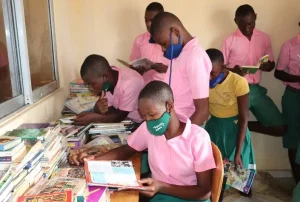
PHOTO: COURTESY
Every month, when it is that time of the month a phrase society uses to politely sidestep the reality of blood and pain I drag myself out of bed as though nothing is wrong. My uterus feels like it’s running a demolition project, the bleeding is so heavy I track bathroom breaks like battle strategies, and yet, I still show up for work, deadlines, and responsibilities. Because that’s the expectation. Smile. Produce. Perform. Bleed quietly.
If I dare to say, “I’m in too much pain to function,” the response is predictable: a shrug, a chuckle, or that tired line “That’s normal. All women go through it.”
And that’s the real problem. Pain has been recast as ordinary. Women’s suffering is not only dismissed it’s glorified. We’re handed a cultural crown of thorns and told to wear it with pride, as though endurance itself were our crowning achievement.
The Medical Gaslighting
The first betrayal often happens in the doctor’s office. Historically, women’s pain has been minimized, doubted, or outright ignored. One study found that women wait 33% longer than men to receive pain medication in emergency rooms. It’s not just a delay it’s disbelief.
This disbelief is devastating when applied to reproductive health:
- Painful Periods (Dysmenorrhea): Around 80% of women experience menstrual pain; up to 15% suffer pain so severe it disrupts work or school. Yet the advice is often reductive “Take painkiller, it’s just cramps.” This easy dismissal not only normalizes unnecessary suffering but also hides conditions like endometriosis.
- Endometriosis: Affecting 1 in 10 women globally, this condition can cause agonizing pain and infertility. Yet diagnosis takes an average of 7 to 10 years in many countries. Seven years of being told it’s “just stress” or “bad periods.” Seven years of pain treated as imaginary.
- PCOS (Polycystic Ovarian Syndrome): Another 1 in 10 women battle this condition, with symptoms ranging from irregular cycles to chronic pelvic pain. Many see three or more doctors before diagnosis, enduring years of uncertainty.
- Fibroids: Affecting up to 70% of women by age 50, fibroids cause heavy bleeding, back pain, and anemia. Still, many are told to simply “manage it” until the pain becomes unbearable.
This is not medicine it’s gaslighting drapped in white coats.
The Heroism of “Showing Up”
We admire women who grit their teeth through pain as though it’s a badge of honor. The colleague who attends a meeting pale and sweating is hailed as “dedicated.” The mother who juggles child care while recovering from a C-section is “superhuman.”
But what we’re really applauding is their ability to suppress pain. We’ve built a culture where silence equals strength, and asking for relief equals weakness.
To admit, “I can’t work today, I’m doubled over with cramps,” risks judgment: lazy, unreliable, dramatic. And so we push through. We suffer in silence. We wear our pain as armor because that’s what society demands.
Motherhood: Pain as Proof of Love
No discussion of normalized pain is complete without childbirth and postpartum recovery. Labor is one of the most painful experiences a human body can endure, but it’s often romanticized as “natural” and “beautiful.” Pain relief is seen as optional, even indulgent.
And then comes postpartum. Up to 36% of women report severe pain in the first 72 hours after delivery, with many struggling for weeks. Yet they’re expected to host visitors, breastfeed, keep the house together, and return to work often without adequate medical or emotional support.
The fourth trimester is one of the most overlooked phases of women’s health. Instead of care and rest, mothers get platitudes: “That’s just how it is.”
The Cult of Resilience
This is the paradox: women are celebrated for resilience, but that celebration keeps them chained to suffering. To show up in pain is “inspiring.” To demand recognition of that pain is “complaining.”
But resilience should not mean tolerance of neglect. Stoicism is not strength; it is survival in a system designed to ignore you.
Breaking the Silence
It’s time to dismantle this narrative:
- Believe Women: A woman’s testimony about her pain must be enough to warrant investigation and care.
- Invest in Research: For decades, women’s health has been underfunded. Closing the gender pain gap requires more than sympathy it needs resources.
- Change Work Culture: Workplaces should normalize conversations about menstruation, postpartum recovery, and reproductive health without stigma.
- Reject Pain as Heroism: Stop praising women for enduring pain. Start asking why they have to.
Conclusion: Laying Down the Crown
Every month, I drag myself out of bed, push through the pain, and show up because that’s what’s expected. But showing up doesn’t mean the suffering is acceptable.
The crown of thorns society places on women bleed, ache, endure, repeat was never a gift. It’s a burden we should refuse to carry. A woman’s worth is not in how much she can endure in silence, but in her right to live without unnecessary suffering.
It’s time we stop applauding women for surviving pain and start building a world where they don’t have to.


